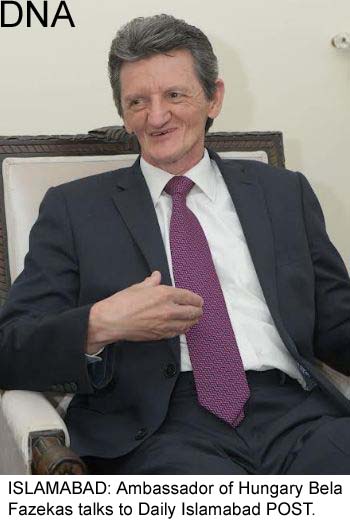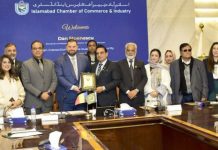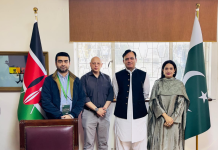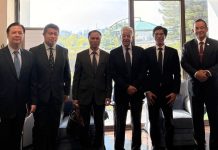An Interview with H.E. Béla Fazekas, Ambassador of Hungary to Pakistan
EXCLUSIVE
Ansar Mahmood Bhatti
ISLAMABAD: As his tenure in Pakistan comes to a close, the Hungarian Ambassador to Pakistan, H.E. Béla Fazekas, reflects on the evolving bilateral relationship between Hungary and Pakistan. In a candid and thoughtful interview, Ambassador Fazekas offers insight into the diplomatic, economic, and cultural ties that have developed over the years—and outlines opportunities for a brighter, more connected future between the two nations. First of this interview was published in this newspaper on May 12, 2025.
When asked to assess the current state of political, economic, and cultural relations between Hungary and Pakistan, Ambassador Fazekas described the relationship as being “more than friendly and less than strategic.” However, he emphasized that the two nations are just a “stone’s throw away” from forging a truly strategic partnership.
“Over the past five years, we’ve covered significant ground,” he noted, underscoring the importance of consistent diplomatic engagement. “Economic and trade relations, however, tell a different story.”
The ambassador highlighted one of the most remarkable economic success stories: the long-standing presence of Hungarian oil and gas giant MOL in Pakistan. Since 1999, MOL has been active in the country’s energy sector, investing over USD 3 billion and contributing immensely to Pakistan’s energy security—particularly in the Khyber Pakhtunkhwa province.
Despite security challenges in that region, MOL has remained committed, even as many other Western companies exited. “This unwavering engagement speaks volumes about MOL’s confidence in Pakistan and its people,” said Fazekas.
On the flip side, the broader picture of bilateral trade leaves room for improvement. Though the trade volume has doubled in five years—from USD 50 million to USD 100 million—Ambassador Fazekas pointed out that this still does not reflect the true potential of the relationship.
Referencing the past “Nokia era,” when Hungarian-made cellphones were ubiquitous in Pakistani households, he said, “Those days might not return, but we must find a substitute—another flagship product to revive the vibrancy of our trade relations.”
Ambassador Fazekas is particularly proud of Hungary’s contributions to education in Pakistan. Despite being a relatively small nation in terms of geopolitical power, Hungary boasts one of the highest numbers of Nobel Prize winners per capita—a feat he attributes to its world-class higher education system.
In the last decade, Hungary has steadily increased the number of government-funded scholarships for Pakistani students, beginning with 80 and now offering 400 scholarships annually. The demand is overwhelming, with 15,000 to 18,000 applicants every year, demonstrating the high regard in which Hungarian education is held among Pakistani youth.
Additionally, hundreds of Pakistani students pursue self-funded studies in Hungary, making them one of the largest Pakistani student diasporas in Europe—and the largest under any single government’s scholarship program.
“These young people are ambassadors of Pakistan in Hungary,” said Fazekas, emphasizing the role of education in building long-lasting people-to-people connections.
On how Pakistan can enhance its presence in Hungary, Ambassador Fazekas offered pragmatic advice. “Establish a commercial counselor’s post at the embassy—or better yet, open a dedicated trade office in Budapest,” he recommended.
He also emphasized the need to leverage the presence of Pakistani students to deepen cultural understanding. “They can organize cultural events, culinary festivals, even introduce cricket to Hungarian youth. They are energetic, smart, and full of potential. Let them establish Pakistan as a beloved brand in Hungary.”
When asked if he would consider returning to Pakistan in the future, Ambassador Fazekas responded with warmth and realism. “Yes, I would. But being closer to 70 than 60, I don’t think Pakistan will be high on my bucket list. Still, I look forward to watching Pakistan become one of the success stories of the 21st century—something I believe will happen sooner or later.”
“A young country with ancient civilization,” Fazekas said without hesitation—capturing the essence of Pakistan’s identity in a single, powerful sentence.
In his parting words, the ambassador expressed deep gratitude:
“I just want to thank my Pakistani friends for treating me like one of their own. I apologize if at times I was too honest—perhaps even too blunt—but it was never against them, always for them.”
Ambassador Béla Fazekas leaves Pakistan with admiration and hope. His tenure has been marked by mutual respect, shared values, and a vision for even closer ties between Hungary and Pakistan. As both nations look to the future, it is evident that education, trade, and cultural exchange will form the bedrock of a truly strategic partnership.=DNA

















